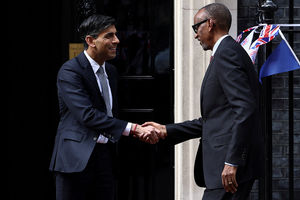CROSS ROADS : Making politics on food as the poor stare at hunger
What you need to know:
- According to media reports, some citizens in the country are facing hunger. This has pushed the government to react. Prime Minister Kassim Majaliwa visited the National Food Reserve Agency (NFRA) warehouses in Dar es Salaam and Songea. In the latter he directed the authority not to sell the current stock until the next harvest.
Should the current food crisis be declared a national disaster? The leader of the opposition party, Alliance for Change and Transparency (ACT Wazalendo), Zitto Kabwe, thinks so.
According to media reports, some citizens in the country are facing hunger. This has pushed the government to react. Prime Minister Kassim Majaliwa visited the National Food Reserve Agency (NFRA) warehouses in Dar es Salaam and Songea. In the latter he directed the authority not to sell the current stock until the next harvest.
The Ministry of Agriculture, Livestock and Fisheries on Wednesday through a State-run newspaper assured that the country had enough food, and added that there was a surplus of 3 million metric tonnes in 2015/16 production.
The ministry explained that national food sufficiency ratio was 123 per cent for 2015/16, and the only problem was some deficit in 43 districts in 15 regions. From the statement, one would think that to stem the crisis, it is a question of logistics -- moving food from the places that had abundant harvests, to those that had little.
How I wish it were as simple as that. That the food, especially grain, prices were very high in many parts of the country, and increasingly becoming unaffordable for the poor, is an open secret.
For instance, in Dar es Salaam maize flour is retailing at an average price of Sh1,600.
The National Bureau of Statistics (NBS) has indicated that price increases in food and non-alcoholic beverages pushed inflation to 7 per cent last month. This is a clear indication that the cost of living has gone up. So, what would happen if the rain fails in the current season? The answer is obvious--worsening inflation.
The fourth phase government had projected that agriculture growth in 2017 would climb to 7.5 per cent. Had the projection turned right, then millions of small scale farmers would be positively impacted. But for now, let’s just keep our fingers crossed.
The Citizen newspaper recently reported that there were concerns that over 21 million livestock were in danger due to shortage of pasture and water. Earlier it had been reported that over 3,800 livestock in Kilosa District, Morogoro Region had died due to drought. The net result of the current situation is that prices of livestock in many areas across the country have really gone down. The joke in some areas is that now a hen is worth more than a mature goat.
While on one hand the government has assured there is enough food, but on the other hand, the citizens are suffering shortages, there is a need for soul-searching at the national level. Should anyone in Tanzania suffer hunger? Should our livestock die due to drought? When you consider that we have some of the best farming lands in Africa, and plenty of water -- rivers, oceans, lakes and even underground water, it is a pity, that our people should suffer hunger, just because there has been no enough rain for a season or two.
It is a great pity that over 50 years after independence poor crop yields have consequently caused our motherland experience interlinked impacts such as food insecurity, malnutrition and abject poverty.
Are our policy, plans and programmes for agriculture feasible? If so then, why have they failed to uplift our poor majority Tanzanians, who remain as peasant farmers? Clearly, as we are rich with almost all factors that support food crop production, as a nation we are supposed to be a net exporter of food across Africa and even beyond. For our nation to move forward in people-centred development, sustainable agriculture and agribusiness must remain one of our national priorities.
Saumu Jumanne is an assistant lecturer, Dar es Salaam University College of Education (DUCE)




